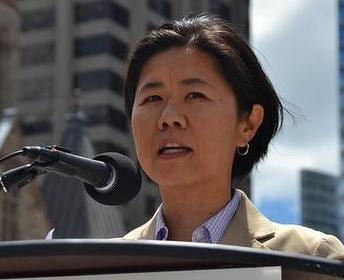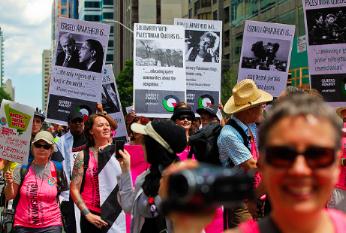
Ward 27 Councillor Kristyn Wong-Tam. Credit: Andrea Houston (file photo)
The leaders of Toronto’s major cultural organizations are drafting a letter to declare support for Pride Toronto (PT) following a move by the city’s executive committee to ban the phrase “Israeli apartheid.”
The show of solidarity is a direct response to a Sept 20 open letter written by Xtra assignment editor Danny Glenwright alerting them to the ban and its possible implications on funding for the arts.
PT co-chair Francisco Alvarez says the issue was discussed at a meeting of the city’s “majors,” those 10 arts festivals and organizations that receive funding from the city.
“[The letter] is basically going to say that freedom of expression is extremely important, and we support allowing artists to speak about what they need to speak about,” he says. “It’s going to respond to the editorial, saying the majors support Pride and not this effort to limit free speech.”
Alvarez says the letter will be released “imminently.”
The group, which includes key people from the Art Gallery of Ontario and the Canadian Opera Company, also posted a response under the editorial on Xtra‘s website. “We have read the open letter you sent to Toronto’s major cultural organizations. As public institutions dedicated to artistic expression, we consider freedom of expression to be an essential element of our mandate,” the comment states.
Council’s executive-committee motion asked the city manager to redraft the city’s anti-discrimination policy to include a ban on the words “Isreali apartheid.”
But Councillor Kristyn Wong-Tam says the motion goes even further and if passed would allow the city to police speech and expression.
“There’s another layer to the amendment. It’s saying there are certain expressions that will not be acceptable. They really cross this line to become the morality police.”
The new language could open the door for people to complain about anything they find offensive, she says. “The [phrase] ‘Israeli apartheid’ is one piece, but there’s also language in the motion that sets a framework that allows people to complain if there’s anything that offends them, so it’s about judgment and morality. To me it goes way beyond the words ‘Israeli apartheid.’ That’s what’s scary.”
Wong-Tam says the city’s major cultural festivals understand the importance of free speech and free expression. “There are so many things in arts and culture that could be offensive to many people, but it’s still art and culture . . . Where does one draw the line? Who decides?”
The city manager is expected to report back to the executive committee in February.
“I want to start community dialogue to ask what this means. What is this language supposed to do to our arts and grant qualifications at the city?” Wong-Tam says.
In the meantime, she is seeking an outside legal opinion.
“I want to know if this will contravene any laws in Canada. I don’t know,” she says. “What is this new grey area we are going into, and who is giving us the right to put limitations on cultural expression?
“In this case, it’s not an extension of rights, but rather a repeal of certain rights for some people.”
For those reasons, Wong-Tam says, the city’s major cultural festivals are right to be concerned about how limitations on speech will affect the festivals. Just this year, for example, the Toronto International Film Festival (TIFF) screened When I Saw You, a film by Annemarie Jacir, a Palestinian director who has openly used the word “apartheid” to describe the situation in her homeland.
“It’s a legitimate and valid concern, and they deserve answers,” Wong-Tam says. “They are coming together with a unified response. Also, the other cultural community, who may not be under the banner of a major, should also take note. It’s not just the majors that are at risk.”
For now, Alvarez says PT is arranging meetings with councillors to gauge how they plan to vote.
“We’re hoping to get a meeting with the city manager when they begin working on that report,” he says. “So hopefully, we can put our input into it, and they will understand what the ramifications for us will be.”
Wong-Tam is also warning people about another motion passed this week at council that could end up being a “loophole for another attack on Pride.”
Councillor Cesar Palacio requested an evaluation of a number of city events, including Pride, she says. Palacio wants a detailed analysis of how city funding and in-kind services are used for various parades.
“We know how the mayor feels about funding parades, so I’m actually wondering if this is a Trojan horse,” she says. “I spoke to [Palacio] and he assures me that it’s not, but I could see it being an open door again for this administration [to attack Pride]. Before the election the mayor was challenging the funding for any type of parade.”

 Why you can trust Xtra
Why you can trust Xtra


